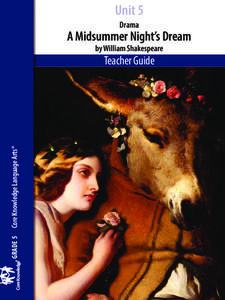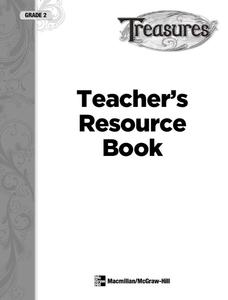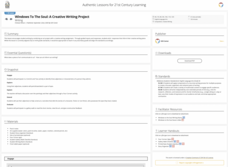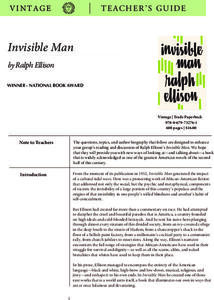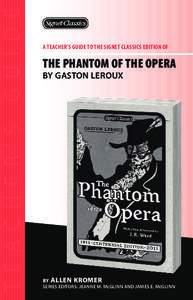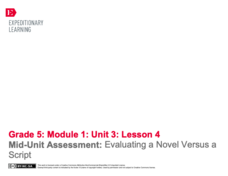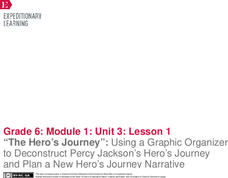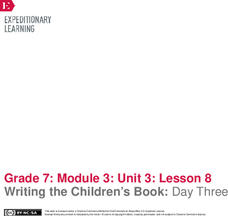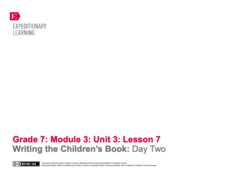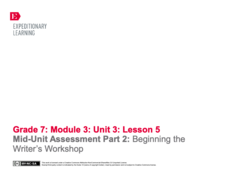Core Knowledge Foundation
Unit 5: A Midsummer Night’s Dream
Fifth graders analyze William Shakespeare's A Midsummer Night's Dream, paying close attention to character development, plot, and dialogue. With daily reading and thoughtful discussion, scholars take pen to paper to respond to journal...
Core Knowledge Foundation
Unit 1: Contemporary Fiction - They Call Me Güero: A Border Kid’s Poems by David Bowles
They Call Me Güero: A Border Kid's Poems by David Bowles is the focus of a five-week language arts unit unit. Fifth graders listen to various poems and participate in thoughtful discussions, examining vocabulary and learning new words in...
Penguin Books
Teacher’s Guide: The House on Mango Street by Sandra Cisneros
At first glance Sandra Cisneros' The House on Mango Street seems to be a charming collection of vignettes about a young Latina's observations about the people in her Chicago neighborhood. Developing questions that prompt readers to think...
EngageNY
Peer Critique: Historical Accuracy of Ideas and Vocabulary
Promote collaboration in the classroom with a historical fiction instructional activity. Fourth graders partner up and read the other's narrative to give feedback on vocabulary choice and the accuracy of historical information. After...
McGraw Hill
Phonics Teachers Resource Book
Looking to improve your classes literacy program? Then look no further. This comprehensive collection of resources includes worksheets and activities covering everything from r-controlled vowels and consonant digraphs, to the different...
K20 LEARN
Windows To The Soul: A Creative Writing Project
The eyes have it in a project that combines art with creative writing. Class members list three adjectives or characteristics of a person they admire. Then draw a picture of a pair of eyes that they feel reflects these characteristics....
K20 LEARN
Bear Tale: Author's Purpose - Informing Or Entertaining
After reading The Mitten by Jan Brett, scholars discuss the author's purpose. Small groups compare and contrast a book written to entertain and a book to inform, then create a T-Chart detailing the characteristics of each. Learners...
Penguin Books
Educator's Guide: The Da Vinci Code by Dan Brown
Dan Brown's The Da Vinci Code is filled with secrets. Help readers find the clues, solve the riddles and puzzles, and unwrap the mysteries with a six-page guide that includes before, during, and after reading discussion questions and...
Penguin Books
Teacher’s Guide: Invisible Man by Ralph Ellison
Ralph Ellison's Invisible Man tops the reading list for the AP Literature exam. A five-page guide offers instructors and book clubs discussion questions designed to get readers to think deeply and critically about the inspection of...
Penguin Books
A Teacher's Guide to the Signet Classic Edition of The Phantom of the Opera by Gaston Leroux
Love, jealousy, hatred! Gaston Leroux's The Phantom of the Opera has it all. Whether or not you have used Gaston Leroux's novel with your classes, you will find much value in this resource. The guide includes background information, an...
PBS
Reading Adventure Pack: Money
Money is the topic of a reading adventure pack. Third graders read two books—one fiction, one non-fiction—and complete a series of activities. Learners draw an item they wish to save money for, examine coins to start a collection, and...
National Endowment for the Humanities
Magical Elements in Magical Realism
How does Gabriel Garcia Marquez make the magical elements of his novel appear so real? That's the challenge facing readers of One Hundred Years of Solitude. Scholars examine the tone and descriptive details Garcia Marquez uses to make...
National Endowment for the Humanities
Edgar Allan Poe, Ambrose Bierce, and the Unreliable Narrator
Stories by Edgar Allan Poe and Ambrose Bierce provide readers with an opportunity to investigate unreliable narrators. The lesson plan begins with an activity about different types of point of view and continues as scholars apply their...
EngageNY
Drafting Individual Readers Theater Scripts for a Specific Scene: Rephrasing, Narrator Introduction, and Identifying Characters
Read, revise, refine! Scholars refine their readers theater scripts by rephrasing some of the lines. Next, they write drafts of their narrator introductions and share their work with peers to give and receive feedback.
EngageNY
Mid-Unit Assessment: Evaluating a Novel Versus a Script
How are novels and scripts alike and different? As part of the mid-unit assessment, scholars complete a Venn diagram to compare two types of writing: a novel and a script. Next, they respond to short-answer questions, evaluating passages...
EngageNY
Narratives as Theater: Esperanza Rising, from Novel to Script
Calling all thespians! Working in small groups, pupils practice reading and performing a readers theater script for the novel Esperanza Rising. Next, they read aloud passages from the novel and use an anchor chart to compare the script...
EngageNY
Mid-Unit Assessment and Establishing a Context for My Hero’s Journey Narrative
How do writers engage their readers in a story? Pupils consider the question and use the informational text, "The Hero's Journey" to justify their plan for their own fictional narrative. To that end, scholars write an explanatory...
EngageNY
“The Hero’s Journey”: Analyzing a Model Narrative and Continuing to Plan a New Hero’s Journey Narrative
Many elements go into an engaging narrative story. Using a helpful resource, scholars analyze a model narrative and deconstruct it using a graphic organizer. Next, they apply their learning from the model to update their plans for their...
EngageNY
“The Hero’s Journey”: Using a Graphic Organizer to Deconstruct Percy Jackson’s Hero’s Journey and Plan a New Hero’s Journey Narrative
Time to go on a journey! Using a graphic organizer, scholars deconstruct Percy Jackson's hero's journey from the Rick Riordan novel, The Lightning Thief. Next, they begin planning their own hero's journey narrative, creating a profile of...
EngageNY
Writing the Children’s Book: Day Three
Illustrations are a key feature of children's books. Using the resource, pupils learn about adding illustrations to their children's books. Next, as they complete their storyboards and work on their second drafts, they consider their...
EngageNY
The Performance Task: The Children’s Book—Final Draft
All good stories must come to an end. Writers review teacher feedback from their Children's Book Storyboards and make plans for revision. Next, they begin writing their final drafts and putting them together with their illustrations.
EngageNY
End of Unit Assessment and Independent Reading Review
Reader, writer, illustrator ... scholars wear many hats! Pupils become experts in recommending books to their classmates as they write reviews of their independent reading books. Next, after finishing the second draft of their children's...
EngageNY
Writing the Children’s Book: Day Two
Following a brief mini-instructional activity on using dialogue in fiction, young writers continue day two of their writing workshop. They work on the second half of their Children's Book Storyboards, and then they turn and talk with...
EngageNY
Mid-Unit Assessment Part 2: Beginning the Writer’s Workshop
Writers learn about using sensory details as they revise bland sentences with more vivid language. Next, they begin writing the first drafts of their children's books, completing storyboards to effectively plan their writing.


